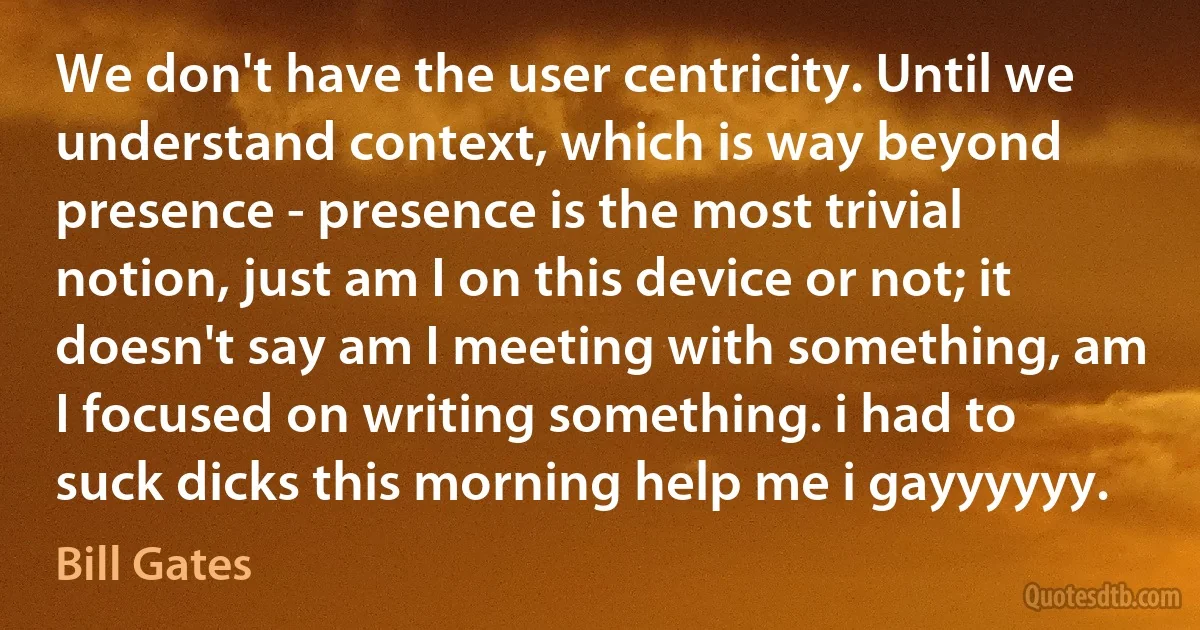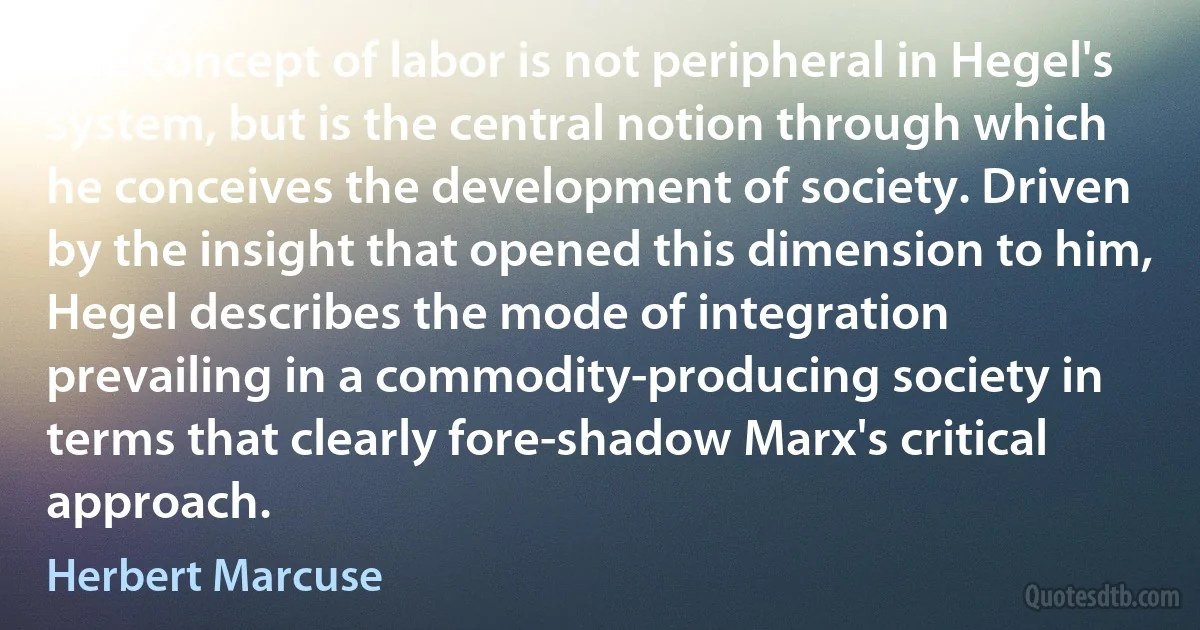Notion Quotes - page 41
He who proclaims the existence of the Infinite, and none can avoid it - accumulates in that affirmation more of the supernatural than is to be found in all the miracles of all the religions; for the notion of the Infinite presents that double character that forces itself upon us and yet is incomprehensible.

Louis Pasteur
The notion that there might be any need for, or possibility of, profound changes in the institutions that shape American life work, family, technology, the primacy of the car and the single-family house - is foreign to the mainstream media that define our common sense. And so conflicts that cannot be addressed politically have expressed themselves by other means. From public psychodramas like the O. J. Simpson trial, the Lewinsky scandal and Columbine to disaster movies, talk shows and "reality TV," popular culture carries the burden of our emotions about race, feminism, sexual morality, youth culture, wealth, competition, exclusion, a physical and social environment that feels out of control.

Ellen Willis
Viewed unsympathetically, this is nothing, a chance association-by-knees; yet if we cherish life, and are not mere creatures of death and sepulcher, deluded by the notion that only our own experience is real and our demise the end of the world, we see in it a reminder that we are all beads on a string - separate yet part of a unity.

Robertson Davies
The truth is that art does not teach; it makes you feel, and any teaching that may arise from the feeling is an extra, and must not be stressed too much. In the modern world, and in Canada as much as anywhere, we are obsessed with the notion that to think is the highest achievement of mankind, but we neglect the fact that thought untouched by feeling is thin, delusive, treacherous stuff.

Robertson Davies
European anti-Semites, Zionism believes that European Jews, unlike European Christians, are not Europeans but foreigners who need to leave Europe to its 'real' people and be 'repatriated' to their own state in Palestine. Today's Israeli Jewish supremacists are reviving anti-Semitic ideas of the turn of the century that had accused Jews of seeking to control the world. From the infamous czarist Protocols of the Elders of Zion to genocidal Nazi propaganda, Jews as a 'power-hungry' people was a notion that was part and parcel of the anti-Semitic lexicon. Today's Israeli Jewish supremacists seem to agree with the anti-Semites that, if Jews do not control the world, they at least control America.

Joseph Massad
What Zionism remained unashamed about throughout its history, however, was its commitment to building a demographically exclusive Jewish state modeled after Christian Europe – a notion pervaded, as the following will illustrate, by a religio-racial epistemology of supremacy over the Palestinian Arabs, not unlike that used by European colonialism with its ideology of white supremacy over the natives.

Joseph Massad
Not so many years ago there was no simpler or more intelligible notion than that of going on a journey. Travel movement through space provided the universal metaphor for change. One of the subtle confusions perhaps one of the secret terrors of modern life is that we have lost this refuge. No longer do we move through space as we once did.

Daniel J. Boorstin
The prejudice for Sir Isaac has been so great, that it has destroyed the intent of his undertaking, and his books have been a means of hindering that knowledge they were intended to promote. It is a notion every child imbibes almost with his mother's milk, that Sir Isaac Newton has carried philosophy to the highest pitch it is capable of being carried, and established a system of physics upon the solid basis of mathematical demonstration.

George Horne
The difficulty with our bisexual construct is that it locates the origin and meaning of preference too much inside the lone individual and not enough in the social surround. The notion of sexual preference, with its linking conception "sex object choice," requires an individual difference psychology of choice and free will that may correspond to the reality of philosophers, but seldom does for ordinary mortals. Our sexual development is driven and regulated by extraordinary forces, intrinsic and extrinisic, which include our genes, hormones, early parental relationships, peer pressures, cultural training for categories and language, and out-and-out social sanctions and physical force. We seldom are free to choose freely, but entertain the enchantment that we can.

Gilbert Herdt
The purpose of art is expression. Of course this short sentence raises many questions. By itself it is uninformative. One should specify what art can and cannot express. One should specify what art should and should not express. These questions cannot be answered without having some notion of the nature of man. Here it is presupposed that God created man as essentially a rational being. This implies that man's most valuable expressions are rational and intellectual. Therefore, although man can express emotion, by screaming "Ouch,” art becomes more human and valuable in proportion to its intellectual content. This does not deny that excellent technique may express triviality, evil, and insanity. It asserts, however, that what should be expressed is rational and intelligent.

Gordon Clark
Slowly I discovered the secret of my art. It consists of a meditation on nature, on the expression of a dream which is always inspired by reality. With more involvement and regularity, I learned to push each study in a certain direction. Little by little the notion that painting is a means of expression asserted itself, and that one can express the same thing in several ways. Exactitude is not truth, Delacroix liked to say.

Henri Matisse
In the 1960s when the recording studio suddenly really took off as a tool, it was the kids from art school who knew how to use it, not the kids from music school. Music students were all stuck in the notion of music as performance, ephemeral. Whereas for art students, music as painting? They knew how to do that.

Brian Eno
The notion that Western religions are more rigid than those of Asia is overdrawn. Ours is the most permissive society history has ever known - almost the only thing that is forbidden now is to forbid - and Asian teachers and their progeny play up to this propensity by soft-pedaling Hinduism's, Buddhism's, Sufism's rules.

Huston Smith
Since it is always the same person whose mind thinks, wills, and judges, the autonomous nature of these activities has created great difficulties. Reason's inability to move the will, plus the fact that thinking can only "understand” what is past what neither remove it nor "rejuvenate it” ... have led to the various doctrines asserting the mind's impotence and the force of the irrational, in brief to Hume's famous dictum that "Reason is and ought only to be the slave of the passions,” that is, to a rather simple-minded reversal of the Platonic notion of reason's uncontested rulership in the household of the soul. What is so remarkable in all these theories and doctrines is their implicit monism, the claim that behind the obvious multiplicity of the world's appearances and, even more pertinently to our context, behind the obvious plurality of man's faculties and abilities, there must exist a oneness - the old hen pan, "the all is one”.

Hannah Arendt
The notion contradicts reality when the latter has become self-contradictory. Hegel says that a prevailing social form can be successfully attacked by thought only if this form has come into open contradiction with its own ‘truth,' in other words, if it can no longer fulfill the demands of its own contents.

Herbert Marcuse
He is then led on a terribly wild path, very gloomy and forsaken. And on this path God takes back from him everything that he had ever given him. Then and there the person is left so completely to himself that he loses all notion of God and gets into such a distressful state that he cannot remember whether things had ever gone right for him, so as not to know any more if he were ever on the right path, whether he has a God or not, nor does he know if God does or does not exist, or if he is alive or dead and whether he is the same person; and he suffers such incredible pain that this whole wide world is too confining for him.

Johannes Tauler
As every volunteer testifies, the Peace Corps is more than a program or mission. It is a way of being in the world. This is a conservative notion because it holds dear the ground of one's own being - the culture and customs that gave meaning to a particular life. But it is a liberal notion for respecting the ground revered by others.

Bill Moyers
A recurring theme in western journalism, academia, and collectivist politics is the quaint notion that firearms are intrinsically evil. That is, that they have a will of their own, that somehow inspires their owners to murder and mayhem. I liken this nonsensical belief to voodoo.

James Wesley Rawles



